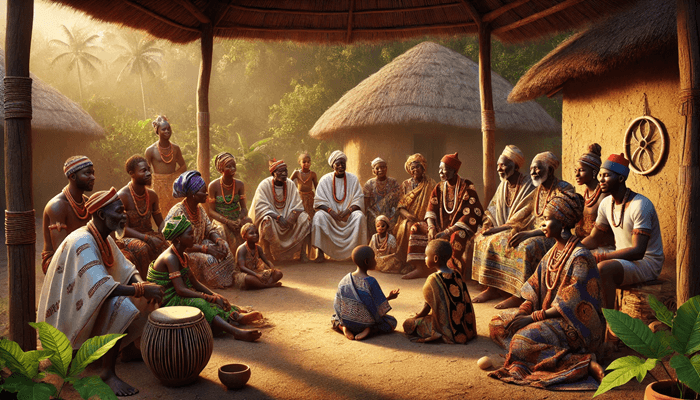Family and kinship are of utmost significance in the Igbo society, which is one of the major ethnic groups of Nigeria. It’s these interconnections that underpin social organization, identity, and values in Igbo culture. The cultural context of Igbo including the role of family and kinship also serve as an insight into its social structure, shared values and communitarian ethos.
Family Structure in Igbo Culture
Traditionally, Igbo family is patrilineal where both lineage and inheritance are traced through the male line. Throughout this concept, the family structure mainly consists of the nuclear family as the main reproductive that does the family cycle and extended family which covers grandparents, uncles, aunts, cousins, other relatives.
A father is the main authority in the house and has the responsibility to sustain and protect their family, as well as making sure the family follows cultural practices. The mother is a key to nurturing the children, organizing the house, working to eat, farming, trading, etc. Family is above all else, children are viewed not just as blessings, but as lifesavers, and an immense blessing for everyone, not just for family, but for the continuation of a family line and family legacy.
Many Igbo believe that marriage reaffirms family ties that bind members within a kinship network through formal ceremonial obligations. Traditional marriage involves both families from bride and groom, indicating joint efforts behind unions.
Extended Kinship Networks
Kinship in Igbo society extends well beyond the nuclear family. You understandably have more important things waiting for you than socialising with the extended family and kinship networks that are so vital to being part of the community. These networks are typically structured into umunna, or a collection of patrilineal descendants, and umuada, or a group of women born into a specific lineage.
The umunna is a complex institution, encompassing both a support system and decision-making body. Members of the umunna meet to settle disputes, arrange community projects and offer financial and moral support during events like weddings, funerals and festivals.
Umuada play a special role as custodians of tradition and as mediators within the family and community. They intervene in conflicts and ensure the enforcement of cultural values and norms.
Communal labor, gift exchanges and celebrations similarly serve to deepen kinship ties. Such practices bring about solidarity and collective responsibility, according to which no person would be left alone to deal with problems.
Value System and Cultural Significance
The Igbo way of life is heavily built upon ubuntu (community), respect for elders, as well as the fact that individuals are entwined within the family and other kinship networks. The Igbo saying, “Onye aghala nwanne ya” (“Let no one leave their brother behind”) captures the essence of this focus on helping others for the benefit of collective wellbeing.
The elderly are respected as guardians of knowledge and culture. People follow their advice in making decisions and seek their blessings for success. Respect for elders is deeply intertwined with the concern for continuity, passing on valued cultural heritage from one generation to the next.
Hard work, education and integrity are also fundamental values of the Igbo people as they consider them impirical evidence towards their growth. Family and kinship networks to which individuals belong frequently combine resources to provide support for education, small businesses, and other means of uplift for the individual, and by extension, the community.
Challenges and Evolution
Changing with modernization and urbanization, traditional family and kinship structures are still significant. Nuclear families are more prevalent, and younger people might have weaker ties to extended kinship networks thanks to geographical mobility.
Despite few societal changes, the fundamental principles of mutual aid, respect, and social responsibility remain. Culture and kinship traditions are preserved through festivals, family reunions and the use of modern technology to maintain kinships.
Family and kinship are central to Igbo culture and govern social relationships, morals, and communal life. One would say, these structures laterally become a foundation of unity, camaraderie and belongingness, keeping people attached to their roots with the ever changing society. The lasting importance of these connections speaks to the ageless counsel of the Igbo, highlighting the role of today in moving forward through the lens of strong community and common identity through similiarities of customs and culture.
